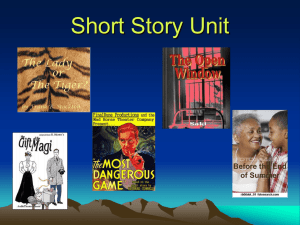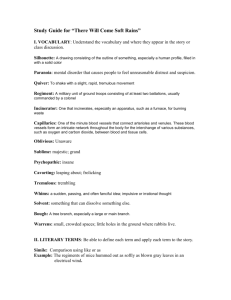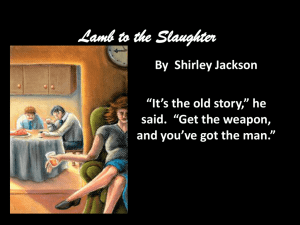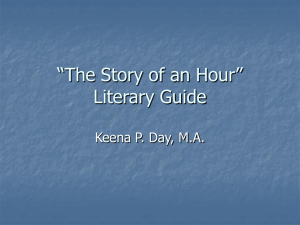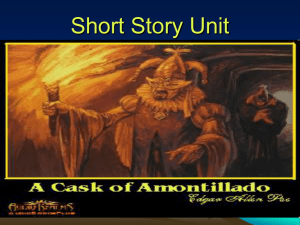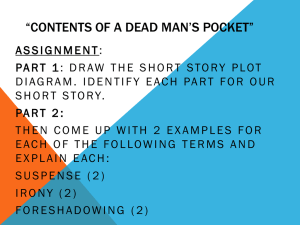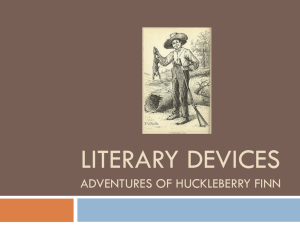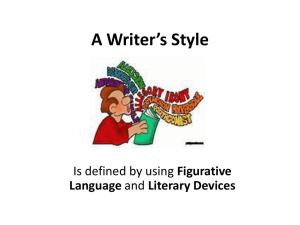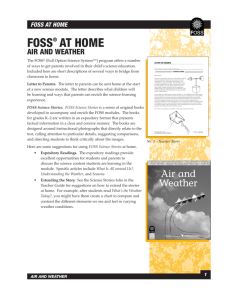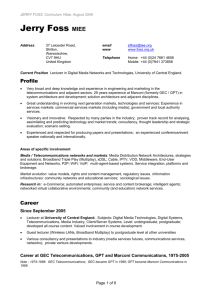CCV Quiz I
advertisement
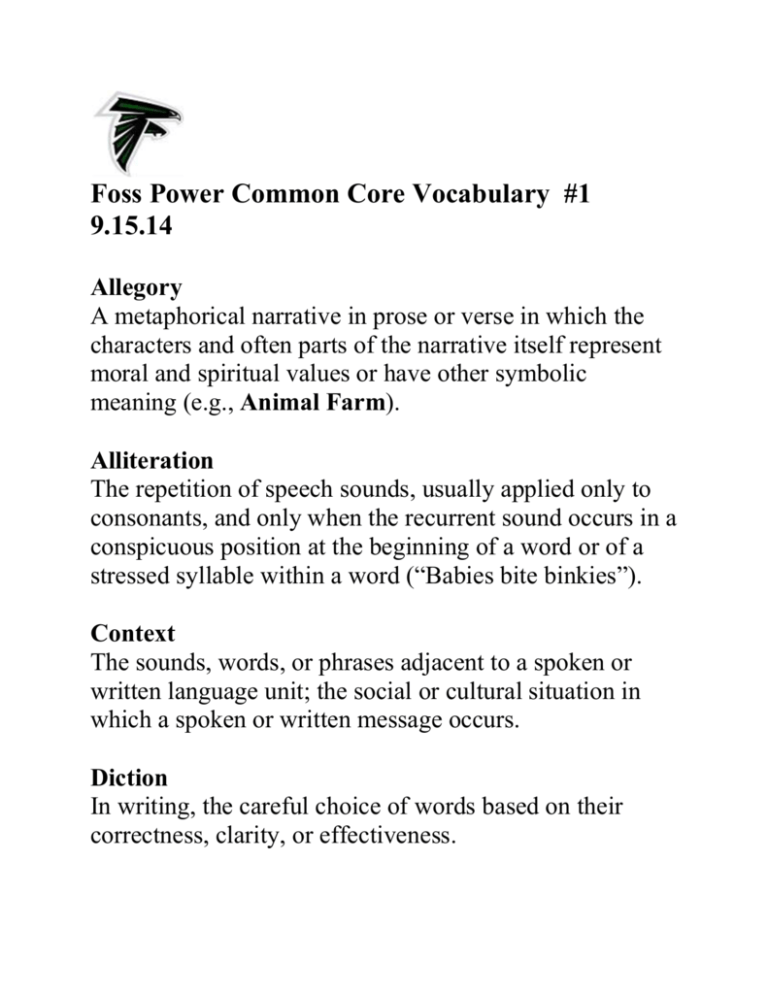
Foss Power Common Core Vocabulary #1 9.15.14 Allegory A metaphorical narrative in prose or verse in which the characters and often parts of the narrative itself represent moral and spiritual values or have other symbolic meaning (e.g., Animal Farm). Alliteration The repetition of speech sounds, usually applied only to consonants, and only when the recurrent sound occurs in a conspicuous position at the beginning of a word or of a stressed syllable within a word (“Babies bite binkies”). Context The sounds, words, or phrases adjacent to a spoken or written language unit; the social or cultural situation in which a spoken or written message occurs. Diction In writing, the careful choice of words based on their correctness, clarity, or effectiveness. Fate The universal principle by which the order and outcome of things is presumed to be predetermined; the destiny of an individual or society. Foss Power Common Core Vocabulary #2 9.22.14 Connotation An idea or feeling that a word brings to mind in addition to its literal or primary meaning. Ex.: skinny vs slender—the connotation of skinny is somewhat negative, while the connotation of slender is positive, even though both words mean the same. Conventions Conventions are a courtesy to the reader, making writing easier to read by putting it in a form that the reader expects and is comfortable with; conventions in writing include mechanics; mechanics are the conventions of print that do not exist in oral language, including spelling, punctuation, capitalization, and paragraphs. Denotation The literal or primary meaning of a word. Imply To state indirectly; to suggest; to hint; to give indirect evidence. “The reporter’s comments imply that a crime was committed.” Infer To deduce meaning; to draw a conclusion from what’s been said. “I inferred that I have bad breath because you offered me a mint.” Foss Power Common Core Vocabulary #3 9.29.14 Analogy An analogy is a literary device that uses comparison. It is a comparison in which an idea or a thing is compared to another thing that is quite different from it. It aims at explaining that idea or thing by comparing it to something that is familiar. Metaphors and similes are tools used to draw an analogy. An analogy is more extensive and elaborate than either a simile (uses like or as for comparison) or a metaphor (more direct—does not use like or as). Evidence Evidence is a type of literary device that appears in different categories of essays and theses in the form of paraphrase and quotations. It is presented to persuade the readers and used with powerful arguments in the texts or essays. It is factual information that helps the reader reach a conclusion and form an opinion about something. Plagiarize To plagiarize is to take the written work of someone else and claim it as one’s own. One avoids plagiarism by giving attribution to the actual author. Refutation Refutation is a literary term denotes that part of an argument where a speaker or a writer encounters contradicting points of view. Refutation can be described as the negation of an argument, opinion, testimony, doctrine, or theory, through contradicting evidence. It normally constitutes a part of an essay that disproves the opposing arguments. Rhetoric Rhetoric is a technique of using language effectively and persuasively in spoken or written form. It is an art of discourse, which studies and employs various methods to convince, influence or please an audience. Foss Power Common Core Vocabulary #4 10.6.14 Archetype In literature, an archetype is a typical character, an action or a situation that seems to represent such universal patterns of human nature. An archetype, also known as universal symbol, may be a character, a theme, a symbol or even a setting. Many literary critics are of the opinion that archetypes, which have a common and recurring representation in a particular human culture or entire human race, shape the structure and function of a literary work. Cite To cite means to write or say the words of (a book, author, etc.) to mention (something) especially as an example or to support an idea or opinion. Explicit Explicit is typically used as an adjective that means stated clearly and in detail, leaving no room for confusion or doubt. “She gave explicit directions.” Explicit also means limited to the exact meaning of a word or text—"a literal translation.” Stereotype A stereotype is a thought that can be adopted about specific types of individuals or certain ways of doing things. These thoughts or beliefs may or may not accurately reflect reality. A stereotype (noun) is a well-known idea or image of a person or idea that is held by a number of people. To stereotype (verb) is to attach a widely held image or belief to a person or a group whether or not that image or belief is accurate. Voice In rhetoric and literary studies, voice is the distinctive style or manner of expression of an author or narrator. In traditional grammar, voice is the quality of a verb that indicates whether its subject acts (active voice) or is acted upon (passive voice). Voice is also the distinct personality of a piece of writing. Foss Power Common Core Vocabulary #5 10.12.14 Audience The person(s) reading a text, listening to a speaker, or observing a performance. An internal audience refers to the imaginary listener(s) or audience to whom a character speaks in a poem or story. A good writer considers his/her audience when selecting use of certain words. Credibility The quality of being believable or worthy of trust. His credibility is high, because he has never lied. Fallacy A fallacy is a mistaken belief or argument, especially one based on unsound reasoning. It is faulty thinking, because it is based on something that is wrong or untrue. The king relied on the fallacy that women determine the sex of offspring. Irony Irony is a figure of speech in which words are used in such a way that their intended meaning is different from the actual meaning of the words. There are two basic kinds of irony: verbal irony and situational irony. A verbal irony involves what one does not mean. When in response to a foolish idea, we say, “What a great idea!” This is verbal irony. A situational irony occurs when, for instance, a person is laughing at the misfortune of someone else even when the same misfortune, in complete unawareness, is happening to the person who is laughing. It was ironic that Jay laughed at the accident victim right before Jay got hit by a train. Pronouns These are words that take the place of nouns: I, he, she, they, we, it, me, him, her, us, them, him, her, his, hers, your, yours, their, theirs, mine, our, ours, myself, himself, herself, themselves, ourselves are some examples of pronouns. Using a pronoun can keep someone from having to repeat the noun. Foss Power Common Core Vocabulary #6 10.20.14 Primary Source A primary source is a document or physical object which was written or created during the time under study. These sources were present during an experience or time period and offer an inside view of a particular event. “She used a primary source document to support her research.” Protagonist There are three main definitions of what protagonist means: 1) The leading character or one of the major characters in a drama, movie, novel, or other fictional text 2) The main figure or one of the most prominent figures in a real situation 3) An advocate or champion of a particular cause or idea “The protagonist had some likeable and not so likeable characteristics.” Soliloquy A soliloquy is a popular literary device often used in drama to reveal the innermost thoughts of a character. In a soliloquy, the character or speaker speaks to himself; the character keeps these thoughts secret from the other characters of the play, but the audience is aware of what the character thinks and feels. “We knew that the character was lonely and depressed because of her soliloquy.” Syntax Syntax is a set of rules in a language. It dictates how words from different parts of speech are put together in order to convey a complete thought. “Knowing proper syntax helps to make us effective writers and speakers.” Understatement Understatement is the presentation of something as being smaller or less important than it actually is. “It is an understatement to say that Michael Jackson liked music.” Foss Power Common Core Vocabulary #7 10.27.14 Antagonist A person who is opposed to, struggles against, or competes with another; opponent; adversary. In literature, this is the person who is the adversary of the hero or protagonist. “Voldemort is the antagonist in the Harry Potter books.” Memoir A memoir is a collection of memories that an individual writes about moments or events, both public and private, that took place in the author's life. “If Kanye wrote a memoir, would Kris Humpries read it?” Parable A parable is a story, usually short and simple, that illustrates a lesson. A parable can be any form of imaginative literature or spoken story constructed in such a way that readers or listeners are encouraged to look for meanings hidden beneath the literal surface of the fiction. “She used a parable to explain why stealing is wrong.”
